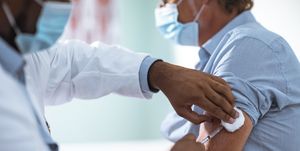The distribution of COVID vaccines has yet to live up to its potential. The original goal: Vaccinate 20 million people by the end of December, higher ups at Operation Warp Speed said. Currently, there have only been 16,525,281 vaccines administered, of which only 2,161,419 have received a second dose.
The reasons vary— states holding back vaccines; lack of resources, and even health workers destroying vaccines. Regardless, these delays are putting people in jeopardy of not receiving their second dose on time.
How bad is it if you don’t get your second dose on time?
We don’t know exactly, because there haven’t been studies on it yet. It’s probably not ideal to go too long, experts say, but there’s a little disagreement on how long it’s OK to go between shots.
For the Pfizer vaccine, the ideal is a 21-day gap between doses, and the efficacy jumps from about 52to 60 percent to about 95 percent after the second. Moderna has a 28-day span between its initial and second dose, at which time the efficacy climbs from about 85 to 90 percent to roughly 95 percent.

Health experts out of The Ohio State University Wexler Medical Center say that clinical data suggest that you can go three to seven days past when you’re supposed to get the second shot.
Other experts say longer might be OK. “If you miss the second dose by a few weeks it’s unlikely that it would be an issue,” says Leo Nissola, MD, a physician, scientist, and researcher focused on fighting advanced-stage cancers with the immune system, COVID-19, and other immunodeficiencies, “but if it takes several months, one might need to be re-vaccinated.”
Daniel B. Fagbuyi, MD, an emergency physician and an Obama Administration Biodefense and Public Health Appointee advises that even if late, when you the opportunity arises, get the second dose. “You will likely have improved efficacy closer to when you receive your second shot,” he says.
A quick refresher: The reason we need two doses is because the second injection helps boost the efficacy of the first dose by re-exposing you to the immunizing antigen. That helps the body produce a strong enough level of antibodies that if you do happen to get the virus, your body can put the kibosh on it.
There has been some chatter that only having partial immunity could potentially leave folks open to new COVID variants. (New strains are already a concern.) According to Dr. Fagbuyi, there isn’t enough data to determine this at this time.
Either way, there’s one thing all experts can agree on: The vaccine was tested according to a specific set of guiding principles and should be taken in that manner. In other words, get your second shot 21 or 28 days after the first, depending on your specific vaccine, and follow standard COVID protocol before, in between, and after: washing hands, practicing social distancing and wearing a mask.
Source: Read Full Article

